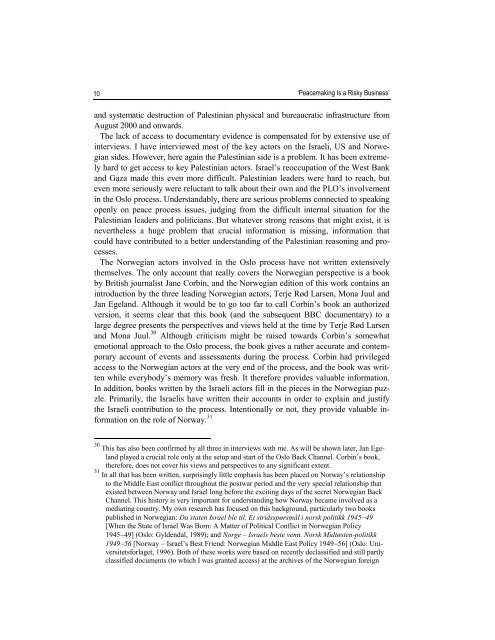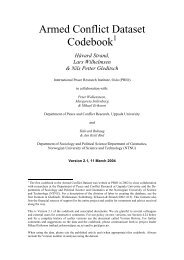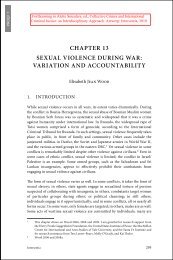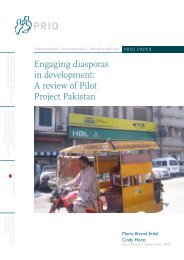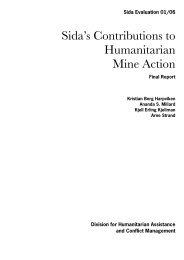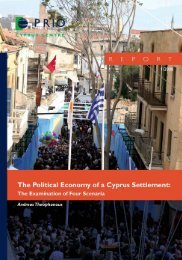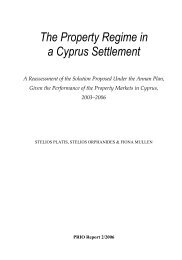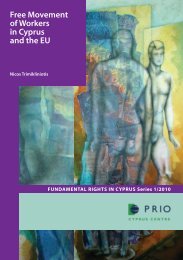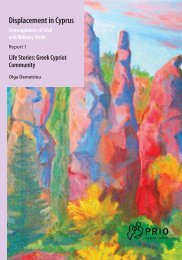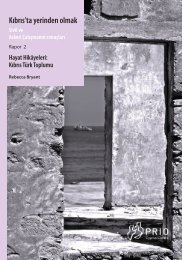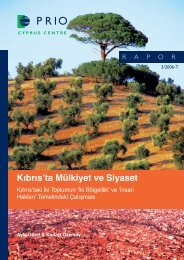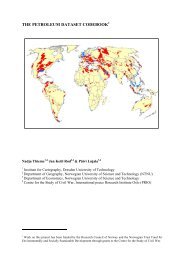Peacemaking Is a Risky Business - PRIO
Peacemaking Is a Risky Business - PRIO
Peacemaking Is a Risky Business - PRIO
You also want an ePaper? Increase the reach of your titles
YUMPU automatically turns print PDFs into web optimized ePapers that Google loves.
10 ‘<strong>Peacemaking</strong> <strong>Is</strong> a <strong>Risky</strong> <strong>Business</strong>’and systematic destruction of Palestinian physical and bureaucratic infrastructure fromAugust 2000 and onwards.The lack of access to documentary evidence is compensated for by extensive use ofinterviews. I have interviewed most of the key actors on the <strong>Is</strong>raeli, US and Norwegiansides. However, here again the Palestinian side is a problem. It has been extremelyhard to get access to key Palestinian actors. <strong>Is</strong>rael’s reoccupation of the West Bankand Gaza made this even more difficult. Palestinian leaders were hard to reach, buteven more seriously were reluctant to talk about their own and the PLO’s involvementin the Oslo process. Understandably, there are serious problems connected to speakingopenly on peace process issues, judging from the difficult internal situation for thePalestinian leaders and politicians. But whatever strong reasons that might exist, it isnevertheless a huge problem that crucial information is missing, information thatcould have contributed to a better understanding of the Palestinian reasoning and processes.The Norwegian actors involved in the Oslo process have not written extensivelythemselves. The only account that really covers the Norwegian perspective is a bookby British journalist Jane Corbin, and the Norwegian edition of this work contains anintroduction by the three leading Norwegian actors, Terje Rød Larsen, Mona Juul andJan Egeland. Although it would be to go too far to call Corbin’s book an authorizedversion, it seems clear that this book (and the subsequent BBC documentary) to alarge degree presents the perspectives and views held at the time by Terje Rød Larsenand Mona Juul. 30 Although criticism might be raised towards Corbin’s somewhatemotional approach to the Oslo process, the book gives a rather accurate and contemporaryaccount of events and assessments during the process. Corbin had privilegedaccess to the Norwegian actors at the very end of the process, and the book was writtenwhile everybody’s memory was fresh. It therefore provides valuable information.In addition, books written by the <strong>Is</strong>raeli actors fill in the pieces in the Norwegian puzzle.Primarily, the <strong>Is</strong>raelis have written their accounts in order to explain and justifythe <strong>Is</strong>raeli contribution to the process. Intentionally or not, they provide valuable informationon the role of Norway. 3130 This has also been confirmed by all three in interviews with me. As will be shown later, Jan Egelandplayed a crucial role only at the setup and start of the Oslo Back Channel. Corbin’s book,therefore, does not cover his views and perspectives to any significant extent.31 In all that has been written, surprisingly little emphasis has been placed on Norway’s relationshipto the Middle East conflict throughout the postwar period and the very special relationship thatexisted between Norway and <strong>Is</strong>rael long before the exciting days of the secret Norwegian BackChannel. This history is very important for understanding how Norway became involved as amediating country. My own research has focused on this background, particularly two bookspublished in Norwegian: Da staten <strong>Is</strong>rael ble til. Et stridsspørsmål i norsk politikk 194549[When the State of <strong>Is</strong>rael Was Born: A Matter of Political Conflict in Norwegian Policy194549] (Oslo: Gyldendal, 1989); and Norge – <strong>Is</strong>raels beste venn. Norsk Midtøsten-politikk194956 [Norway <strong>Is</strong>rael’s Best Friend: Norwegian Middle East Policy 194956] (Oslo: Universitetsforlaget,1996). Both of these works were based on recently declassified and still partlyclassified documents (to which I was granted access) at the archives of the Norwegian foreign


